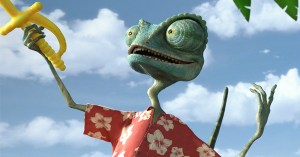Total Recall: David Fincher’s Filmography
We present the work of the Social Network director in chronological order.
He’s given us aliens, serial killers, cerebral thrillers, shocking endings, and a glimpse of Brad Pitt as an old man — and now, with The Social Network, David Fincher has helped turn the story of Facebook into one of the most eagerly awaited (and best-reviewed) films of 2010. With that kind of track record, folks will bend the rules for you once in awhile, and in that spirit, we’ve decided to dedicate this week’s feature to Mr. Fincher’s filmography, presented in chronological order. He may not have enough movies to his credit to round out a Top Ten, but many of the ones he has made are among the most compelling of the last 20 years. But don’t take our word for it — let’s see what the critics have to say, Total Recall style!
Alien 3
After making a splash as a director of music videos and commercials — including the legendary commercial clip that depicted a fetus smoking a cigarette — Fincher got his big feature break with the highly anticipated third installment of the Alien franchise. Unfortunately, all that anticipation turned to scorn once Alien 3 arrived in theaters, but it wasn’t all Fincher’s fault; as a rookie 30-year-old director, he never had a chance against the studio confusion and constant script doctoring that plagued the project. Not many people understood that in 1992, though, and it didn’t soothe Fincher’s frustration, which was significant enough to send him temporarily back to videos and commercials. Still, even if Alien 3 is widely regarded as the weak link in the original quadrilogy, it has its admirers — including Entertainment Weekly’s Owen Gleiberman, who called it “a grimly seductive end-of-the-world thriller, with pop-tragic overtones that build in resonance as the movie goes on.”
Seven
Chagrined by his experiences with Alien 3, Fincher swore off feature films for a year and a half — and then he read Andrew Kevin Walker’s script for Seven. An unrelentingly grim portrait of a society in its hellish death throes, the grisly drama followed a pair of police detectives (Brad Pitt and Morgan Freeman) in pursuit of a serial killer whose ingeniously executed murder victims serve as human embodiments of the seven deadly sins. Fincher, who’d become painfully well acquainted with studio interference while making Alien 3, was forced to defend his bleak vision for the film, which New Line nearly sent to theaters with a different, less brutally shocking ending — but Pitt refused to promote the altered cut, and the result was one of the biggest hits of the year, as well as a nightmare-inducing favorite for critics like Marc Savlov of the Austin Chronicle, who wrote, “Positively dripping with a soggy, oppressive atmosphere, the film is blanketed with a miasma of madness.”
The Game
Flush with the success of Seven, Fincher returned his focus to a project he’d begun earlier: The Game, a twisty psychological thriller starring Michael Douglas as Nicholas Van Orton, an investment banker whose wealth and success mask a personal life bereft of meaningful connections. On his birthday, Nicholas receives a darkly intriguing gift from his brother (Sean Penn): admission to a mysterious “game” with apparently life-changing results. And Nicholas’ life is indeed quickly changed — turned upside down, in fact, as he realizes that playing the game has profound, and perhaps even fatal, consequences. Though many critics were quick to point out the implausibilities in The Game‘s head-spinning plot, the majority were too wrapped up in its stylish thrill ride to care. “The picture provides Douglas with one of his best roles,” wrote Mick LaSalle for the San Francisco Chronicle. “If he doesn’t quite reach the bizarre heights he achieved in Falling Down, The Game makes its own demands.”
Fight Club
Yes, we are going to talk about Fight Club. Initially rejected by critics and ignored by audiences, Fincher’s fourth feature steadily built a cult following on DVD; these days, it’s widely regarded as one of the best films of the 1990s, which not only helped reaffirm Fincher as a director of stylishly thoughtful fare, but established the Hollywood bona fides of author Chuck Palahniuk, from whose novel the movie was adapted. The plot follows the eager descent of a nameless protagonist (Edward Norton) into the anti-establishment crusade of Tyler Durden (Brad Pitt), who organizes the underground brawling network known as Fight Club, but on a deeper level, the story functions as a bloody, black-humored indictment of consumer culture. And more importantly, in the words of ReelView’s James Berardinelli, “Fight Club is a memorable and superior motion picture — a rare movie that does not abandon insight in its quest to jolt the viewer.”
Panic Room
A claustrophobic thriller with the heart of a B movie, Panic Room found Fincher taking another stellar cast (including Jodie Foster, Forest Whitaker, and a young Kristen Stewart) and dropping them in the middle of a tightly wound, tension-filled storyline. Panic sets in almost immediately, with single parent Meg Altman (Foster) and her daughter Sarah (Stewart) spending their first night in the huge Manhattan brownstone Meg has just purchased; what Meg and Sarah don’t know is that their new home contains some very valuable hidden treasure — as well as a trio of very bad men (including the skin-crawling Dwight Yoakam and a mysteriously cornrowed Jared Leto) who will stop at nothing to steal it. Where most Fincher films explore thoughtful themes and carry larger messages, Panic Room is mostly just a nail-biter — but one directed with uncommon flair. As Joe Baltake for the Sacramento Bee put it, “The star of this movie is Fincher, who has filmed it in a grand style that manages to avoid showy excesses.”
Zodiac
It’s a movie about one of the most famous serial killers in American history, and it was helmed by the director responsible for Seven — but 2007’s Zodiac is surprisingly light on gore. In fact, while he looms over every minute of the film, it’s really not about the Zodiac Killer at all; rather than focusing on the death toll left in the wake of his murderous spree, it examines the price paid by those who dedicated their lives to solving the case — specifically San Francisco Chronicle cartoonist-turned-sleuth Robert Graysmith (Jake Gyllenhaal) and his colleague, crime reporter Paul Avery (Robert Downey, Jr.). Zodiac is just as dark and visually arresting as you’d expect, given the story and who directed it, but its pensive approach surprised critics — not to mention Paramount, where the marketing campaign played up the story’s grisly element and misleadingly drew ties to Seven. It all added up to a box office disaster, and the source of some of the best reviews of Fincher’s career. Imagining that Fincher was “aching for a return to smart suspense films from the likes of Sidney Lumet and Alan J. Pakula,” Mark Bourne of Film.com lauded the way Zodiac “pulls us by the collar into the frame and cranks the sense of menace taut without cheap tricks or cop-out gimmicks.”
1. The Curious Case of Benjamin Button
Turning an F. Scott Fitzgerald short story into a $150 million, 166-minute epic, The Curious Case of Benjamin Button reunited Fincher with Brad Pitt — who played the backwards-aging Benjamin — and found him delivering his most mainstream-friendly film since 2002’s Panic Room. It featured a marquee-friendly cast (including Cate Blanchett, Tilda Swinton, Taraji P. Henson, and Julia Ormond), revolved around the high drama of a man forced to live his life in reverse, and was stacked high with sweeping cinematography and a Forrest Gump-style survey of 20th century American history, making it the perfect Christmas Day release and an odds-on Academy Awards favorite. It ended up earning 13 Oscar nominations, but won only three (Art Direction, Makeup, and Visual Effects), reflecting the vague sense of disappointment that shadowed Button‘s eventual $333 million worldwide gross. Though it may not have been an unqualified smash, it still found plenty of critical allies — including Joe Morgenstern of the Wall Street Journal, who wrote, “The film quickly outgrows any sense of gimmickry and matures into a one-of-a-kind meditation on mortality, time’s inexorable passage and the fleeting sweetness of love.”
In case you were wondering, here are Fincher’s top 10 movies according RT users’ scores:
1. Fight Club — 95%
2. Seven — 94%
3. The Game — 82%
4. The Curious Case of Benjamin Button — 81%
5. Zodiac — 73%
6. Panic Roon — 61%
7. Alien 3 — 55%
Take a look through Fincher’s complete filmography, as well as the rest of our Total Recall archives. And don’t forget to check out the reviews for The Social Network.
Finally, here’s a Fincher-directed YM commercial featuring a young Angelina Jolie:





